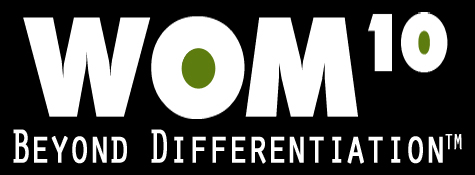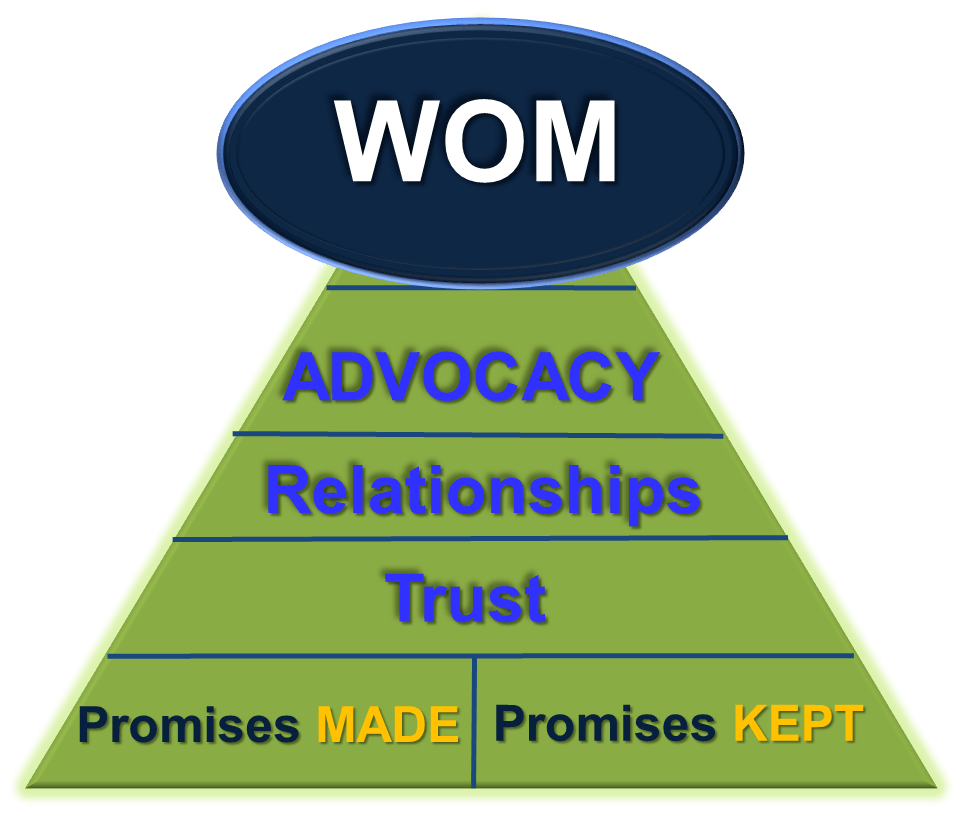There’s a lot of “hype” about trust these days…seems like more people are talking about it than ever before. Maybe it’s because Trust is at an all time low according to the Edelman Trust Barometer report that came out recently. While there are lots of reasons why trust is so low right now, I believe there is one bigger issue regarding trust we all need to focus on…taking it for granted.
Business is so fast paced and competitive in the Customer Economy we live in today, trust ends up being something we “assume” is being built, when just the opposite is happening.
I created a model for how organizations can build massive “Advocacy” with their audience (customers and others) to get this audience raving about them and telling others to work with them. One of the primary (and essential) components of this model is Trust. If anyone is going to talk (favorably) about you, they need to trust you. There must be some level of trust to create an advocate for you or your organization.
There is no one on this planet that will ever be your advocate and market for you if they don’t trust you.
This is what I tell leaders all the time…and while everyone nods and agrees, it’s “taken for granted.” It’s one of those “motherhood and apple pie” type of statements…how can you not agree with it or not believe it…after all, it’s just common sense, right? While it may be common sense, it isn’t happening. Regardless of how natural this sounds or how believable it is, trust isn’t being built by most organizations…at least not proactively and consistently.
If I asked 100 CEOs/Business Owners what they are doing to “actively” build trust with their customers and overall audience, they can’t tell me something specific. There isn’t an active plan in place to make this happen. It is usually “assumed” (and we all know what that means) that it is being built by “the way we do business.” I disagree…I don’t see it being built. In fact, I see it trust being eroded faster than it is being built.
We live in a world of “Commoditization”…where we can find virtually any product or service at a lower price or better availability…thank you Amazon for that gift. While we love commoditization as a consumer, we hate it as a business owner. Customers are now trained to think they can get whatever it is we are selling at a better price or better availability somewhere out there in the world wide web. And, unfortunately, we usually can.
If a company chooses to play in the commodity game (lowering prices to attract customers) they are furthering their position as a commodity but not necessarily building trust. Lowering prices does not build trust…it just lowers profits.
Trust has to be built purposefully. There has to be specific plans for how the organization is going to build it or it will be “taken for granted” and nothing will change. While this is a much more involved discussion, let me leave you with something that I believe will completely change your view of how to build trust.
Promises…the core of how to create or erode trust in any organization.
We created something almost 2 decades ago to solve this problem…we called it “Promises Architecture™.” Check it out…it is a foundation for how to build Advocacy. It starts with “keeping the promises you make.” Sounds simple…it isn’t. There are a variety of tools I use which can help an organization better understand what percentage of promises they are actually keeping…by department, by person. Surprisingly, or maybe not, the amount of “promises kept” is always far lower than the number of “promises made.” And it is always lower than what leadership thinks it is.
Any commitment (explicit, implicit, or implied) is still viewed as a solid promise in the eyes of your customer (and audience).
While we may not use the actual word, Promise, this is the word our audience (customers and others) hears. When you’ve talked to as many customers as I have over the years, the one word they use a lot when telling me about their experiences is “promises.” They tell me, “Well, they promised they would have it to me by this date and it never showed up.” Or, “They promised me they would get back to me with the details on these orders and I didn’t hear from them until I called them back again.” I could go on and on about how the customer uses the word promise in their description. And they feel these promises were not kept, which is why they were dissatisfied with a particular organization.
When I share this information with the leadership team, they are usually shocked. They say they would never have promised this or didn’t know these promises were being made. Really? This is where I think we “take promises for granted.” All they have to do is sit in one of the areas of their business for an hour and they would hear lots of promises being made…rarely using the word promises, but this is what the customer is hearing. We say we will do something…the customer hears the word promise.
Here’s a great exercise you can do tomorrow in your business. Stop by one of your departments and listen to the conversations. I guarantee you will be shocked by the number of promises being made…without the word ever being use.
Trust can never be built if promises are not being kept…never.
Let me give you two simple things your organization can start doing today…if you really want to find out how much trust you are building or eroding.
First - find out what “promises are being made"
Sounds simple, but it can be challenging. It takes some time or effort to actually understand what is being said and done inside an organization. When I help companies figure this out, we actually create a “Promises Inventory” that allows us to see the promises being made throughout the organization by department. It is quite helpful to fully understand what is happening throughout every department every day.
Second - find out what “promises are being kept"
Once again, sounds simple but this, too, can be quite challenging. The goal is to match up what promises were made and see which ones were kept. Where it can get complex is when you realize the number of promises actually being made. For example, if someone says, “We will have this product to you by Friday,” it’s pretty easy to see if they got the product on Friday. This part is simple to track and manage.
These usually represent only a fraction of the promises made. What about, for example, the promises your people make to call someone back “soon.” What does that really mean, and when did we actually call them back…or did we call them back? These promises are much more difficult to track. But to your customer, they believe you made a promise and are waiting to see if you can deliver on it.
There is much more to this than I can talk about here in a post. I will leave you with this…if we don’t know what promises are being made and don’t know which ones are being kept, we can’t determine the degree to which we are building or eroding trust. Because most organizations don’t take make this an active exercise, “TRUST IS TAKEN FOR GRANTED.” We just don’t really know.
I believe every organization should know if they are creating trust or eroding it. If you aren’t creating more trust, you aren’t creating more advocates. To create more advocacy, you must create more trust.
What To Do Next...
How did you feel after reading this post? Did it make you feel uncomfortable because you don’t really know what promises are being made and which ones are being kept? Did it make you uncomfortable because you don’t know if you are creating or eroding trust? Or did it just make you uncomfortable overall because you know you aren’t really doing much to drive trust up and may be taking it for granted? It’s OK to answer yes to one or more of these questions…I just want you to do something about it.
Everything starts with understanding where you are, so you know what you need to do to get where you want. Making an honest assessment of where you are is always the start to change. I’ve given you some insight into how you can figure this out inside your own organization to better understand where you are today. This is the first (and most) critical step to getting a handle on building more trust and not taking it for granted.
Not sure you can do this as I described? I’m happy to help you out with this if you need a boost to get started. Lots of ways to do this so that you can run with it going forward. Or if you just want to talk through it a bit more, let’s grab coffee (or lunch) sometime. The coffee (or lunch) is on you…the education and information is on me. My goal is to help save you TIME in the process if you are interested in being Customer Obsessed and becoming “REMARK”able in the process...which is my passion and goal for every company on the planet. Big goal…but it starts with one.


